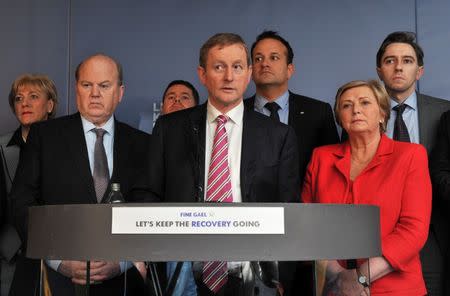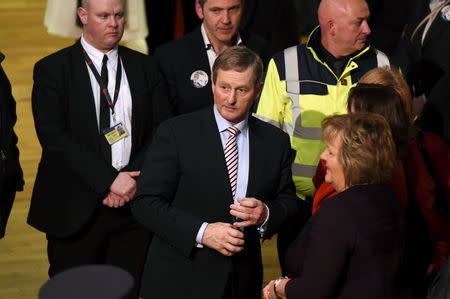Irish rivals drag out stalemate, each aiming to form government
By Padraic Halpin DUBLIN (Reuters) - Ireland's two biggest parties said on Monday they would each try to form a government over the next 10 days, but analysts said last week's inconclusive election meant they may be forced to set aside their differences and form a grand coalition. The second-largest party, Fianna Fail, raised the prospect of an even longer delay by calling for a cross-party deal on reforming parliament before any coalition talks, a process it said could take more than a month. The threat of weeks of political stalemate and a possible second election could take its toll on investors' appetite for Irish government bonds, although yields were little changed on Monday. Rating agency Fitch said protracted political uncertainty, an unstable government, or relying on more radical political elements could be negative for the country's credit rating. After his ruling coalition was ousted by voters angry at the country's uneven recovery, Prime Minister Enda Kenny's Fine Gael was set to fall about 30 seats short of the 80 that would give it a majority in parliament, with vote counting drawing to a close. "We need to look across a broad spectrum of the Dail (parliament) and see where we can find opportunities to discuss the formation of a government," Foreign Minister Charlie Flanagan of Fine Gael told national broadcaster RTE. Asked if that would eventually lead to a deal with rival Fianna Fail - the only combination analysts say will be able to break the impasse - Flanagan said "immovable positions" would not resolve the crisis. Senior figures in both parties have expressed opposition, particularly Fianna Fail, which outperformed forecasts and will likely cut a deficit between it and Fine Gael to just a handful of seats from more than 50 in 2011. Fianna Fail's Billy Kelleher said his party would canvass support among a disparate group of small parties and independent lawmakers to put its leader, Micheal Martin, forward as an alternative prime minister when parliament resumes on March 10. But Martin raised the possibility of a long delay to forming a government, proposing a cross-party agreement on reforming parliament, allowing two weeks for parties to formulate positions and two weeks of interparty talks. He said the election result indicated voters wanted "fundamental change" and called for major curbs on the power of the government, increasing oversight and ending their ability to push through legislation without full debate. Fine Gael did not immediately respond to Martin's statement, which did not mention the possibility of a grand coalition of the two main parties. TWO OPTIONS "Any kind of majority without each other is just not possible," said Theresa Reidy, a politics lecturer at University College Cork. "There are only two options on the table: some kind of minority administration or coalition. "The key question is how far Fianna Fail want to be integrated, and I certainly don't think we're going to get any kind of government very soon, it'll be six or eight weeks before there is a sense of what shape it will take." Ten-year bond yields remained near record lows at 0.89 percent , but traders have cautioned that investors would become more nervous the longer the instability lasts. Analysts are sanguine on the economy, however, saying it can handle some uncertainty after growing around 7 percent last year. Data on Monday suggested that momentum remained strong, with retail sales rising 10 percent year-on-year in January. (Editing by Janet Lawrence and Hugh Lawson)



